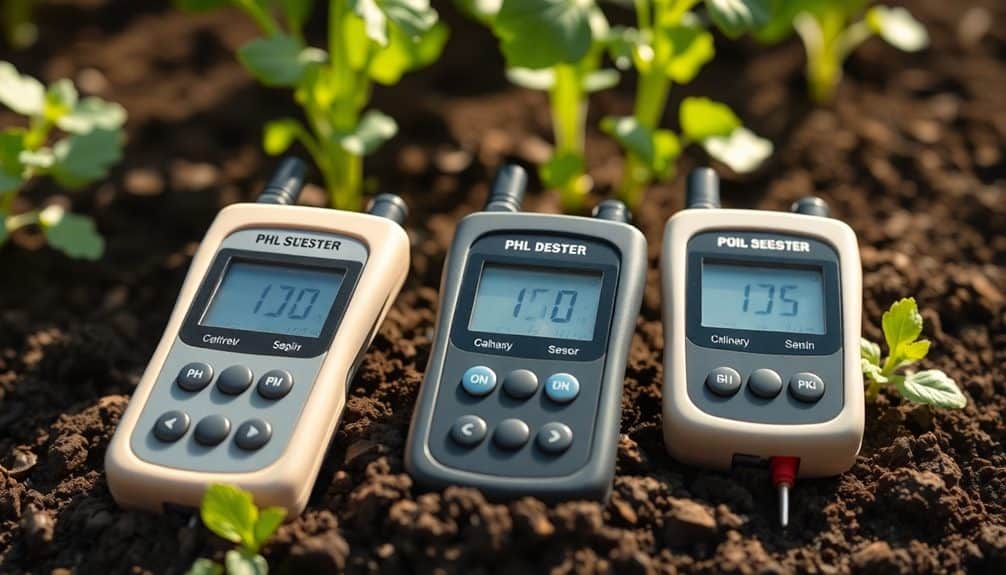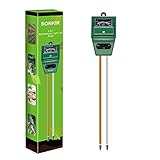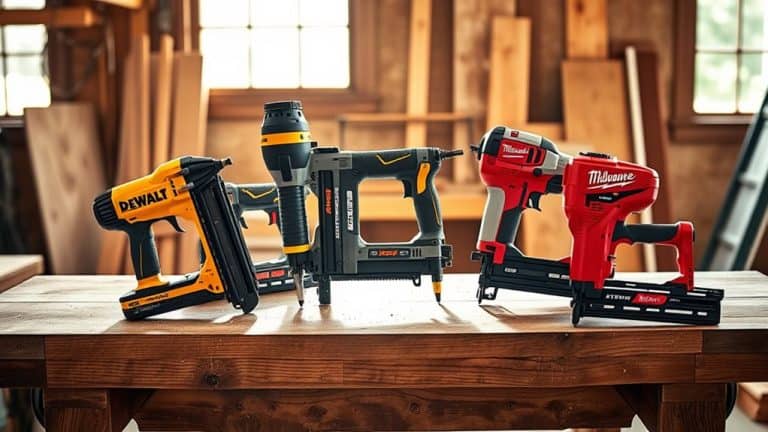This website contains affiliate links. Some products are gifted by the brand to test. As an Amazon Associate, I earn from qualifying purchases. The content on this website was created with the help of AI.
The top soil pH testers of 2024 offer reliable solutions for your gardening needs. The Soil pH Meter MS02 3-in-1 leads with its battery-free design and extensive moisture, pH, and light readings. For digital precision, the 4-in-1 Digital Soil Moisture Meter features advanced sensor technology and a backlit display. The innovative Soil Moisture Meter 4-in-1 stands out with its rotating head and single-probe design. If you prefer simplicity, the Soil pH Test Kit Strips provide quick results, while the Suplong 3-in-1 excels in durability with its corrosion-resistant probes. Understanding the unique features of each tester will help you make the perfect choice for your garden.
Key Takeaways
- The 4-in-1 Digital Soil Moisture Meter leads with its advanced 2024 Sensor Detection Technology, providing quick readings within 10-15 seconds.
- Soil pH Meter MS02 3-in-1 Tester ranks highly with over 43,000 positive ratings and reliable battery-free operation for moisture, pH, and light.
- The Suplong 3-in-1 Soil Moisture Meter excels with dual stainless steel probes and maintains a strong 4.4-star rating from 4,900+ customers.
- Soil Moisture Meter 4-in-1 pH Tester features an innovative 90° rotating head and single-probe design to minimize root damage.
- The 2nd Generation Soil pH Test Kit Strips offer laboratory-grade accuracy with 100 strips and results within 60 seconds.
Soil pH Meter MS02 3-in-1 Moisture/Light/pH Tester
- Kindly NOTE: This soil tester can not be applied to test pH value of any other liquid. If the soil is too dry the indicator will not move, and water...
- 3 METERS IN ONE: Soil moisture level, Soil pH value and Sunlight level could be tested easily according to your need by switching the function button...
- NO BATTERY NEEDED: Simply insert the meter into soil, wait few minutes, accurate test results will be displayed on the readout panel. No battery is...
The Sonkir MS02 3-in-1 Soil Tester serves as an ideal entry-level tool for home gardeners who want to monitor three essential plant health indicators without breaking the bank. This compact device measures soil moisture, pH levels, and sunlight intensity without requiring batteries, making it a convenient choice for both indoor and outdoor use.
You’ll need to insert the probe about 3/4 into moist soil and wait approximately 10 minutes for accurate readings. While the moisture and light meters generally perform reliably, the pH meter’s accuracy can be inconsistent and maxes out at 8, potentially limiting its effectiveness for highly alkaline soils. At 11.5 inches long and weighing just 2.89 ounces, it’s easily portable. With over 43,000 customer ratings averaging 4.1 stars, it’s ranked #4 in Soil Meters, suggesting it’s a practical tool for basic plant care monitoring.
Best For: Home gardening enthusiasts and hobbyists seeking an affordable, basic tool to monitor soil conditions without requiring technical expertise or batteries.
Pros:
- Easy to use portable design that requires no batteries and provides readings for three essential plant health indicators
- Affordable price point makes it accessible for beginner gardeners and casual plant enthusiasts
- Large customer base with generally positive reviews (4.1/5 stars from over 43,000 ratings)
Cons:
- pH meter accuracy is inconsistent and limited to a maximum reading of 8, making it less reliable for alkaline soils
- Requires moist soil and 10-minute waiting period for readings, which may be inconvenient
- Some users report reliability issues with the moisture meter over time
4-in-1 Digital Soil Moisture Meter with pH & Temperature Testing
- 【4-in-1 Multi-Function】This 4-in-1 soil tester can sense soil pH/moisture/temperature/light more accurately and quickly. You can know the soil...
- 【Large green backlit LCD display】More accurate than the traditional dial soil tester test, test data can be more intuitively displayed on the...
- 【More accurate and faster measurements】This soil meter probe uses the latest 2024 Soil Sensor Detection Technology to accurately and quickly...
Anyone seeking thorough soil analysis will appreciate this versatile 4-in-1 digital meter that combines pH, moisture, temperature, and sunlight measurements in one convenient device. Using the latest 2024 Soil Sensor Detection Technology, it delivers readings within 10-15 seconds through a green backlit LCD display that’s visible in any lighting condition.
You’ll find the meter straightforward to use – simply insert the probe 3-5 inches into the soil. While most users report accurate moisture and pH readings, some have experienced inconsistencies, particularly with pH values defaulting to 0 or 7.1. The device runs on 3 AAA batteries (not included) and includes a low battery alert feature. If you encounter issues, you’ll have access to customer support through the satisfaction guarantee. Just remember to avoid probing hard, dry soil to prevent damage to the sensor.
Best For: Home gardeners and plant enthusiasts who want an all-in-one solution for monitoring soil conditions and need quick, comprehensive readings for multiple plants.
Pros:
- Combines four essential measurements (pH, moisture, temperature, sunlight) in one convenient device
- Large backlit LCD display makes readings visible in any lighting condition
- Quick results within 10-15 seconds of insertion
Cons:
- Some users report inconsistent pH readings, particularly noting values stuck at 0 or 7.1
- Batteries not included and requires 3 AAA batteries to operate
- Display can be difficult to read at certain angles while inserting the probe
Soil Moisture Meter 4-in-1 pH Tester for Garden & Indoor Plants
- Free Plant Growing Guide & Free Sandpaper
- 4-in-1 Multi-Function: This hygrometer can meet your needs to measure soil moisture, Ph, nutrients, and light conditions at the same time....
- Single-probe Design: The single-probe with upgraded material. Compared to traditional dual probes, a single probe can reduce damage to plant roots...
Gardening enthusiasts seeking an all-in-one solution will find exceptional value in this 4-in-1 Soil Moisture Meter. You’ll get instant readings on soil moisture, pH, nutrients, and light conditions through its single-probe design, which minimizes root damage. The patented 90° rotating head lets you check readings without bending down, and you won’t need batteries.
While it excels at moisture and nutrient monitoring, there are some limitations to take into account. The pH scale only ranges from 1-8 instead of the standard 1-14, making it less suitable if you’re dealing with alkaline soil issues. The meter’s durability depends on careful use – avoid applying excessive pressure when inserting the probe. You’ll receive sandpaper for maintenance, and customer service is responsive if you encounter issues. For basic garden monitoring, it’s a practical tool that’ll help improve your plant care routine.
Best For: Home gardeners and indoor plant enthusiasts who want an affordable, battery-free way to monitor basic soil conditions and improve their watering routines.
Pros:
- All-in-one design measures moisture, pH, nutrients, and light with a single probe
- No batteries required and provides instant readings within seconds
- Patented 90° rotating head allows for comfortable readings without bending down
Cons:
- Limited pH scale (1-8 instead of 1-14) may not be suitable for alkaline soil testing
- Accuracy of pH readings can be inconsistent and hard to distinguish between close values
- Durability concerns with some units failing after one season of use
Soil pH Test Kit Strips (3.5-9 Range) for Garden and Plants
- PROFESSIONAL-GRADE ACCURACY: Engineered specifically for soil pH testing, delivering results quickly (in about 60 seconds). With a 3rd Generation,...
- WEB-BASED AI READER TECHNOLOGY (UPGRADED FOR 2025): Enhance your soil pH testing experience with our web-based tool - no app downloads or signups...
- DESIGNED IN AMERICA: Created by Garden Tutor, an American brand founded by gardeners who understand your needs. Our designs focus on simplicity,...
Modern gardeners seeking quick and reliable soil analysis will find excellent value in these 100-count pH test strips, which deliver results in just 60 seconds. The 2nd Generation design features a simplified 3-pad system that improves accuracy across all soil types, from sandy to clay-based.
You’ll receive a thorough instructional guidebook that helps you understand how proper pH levels affect nutrient availability for your plants. While the strips offer readings in the 3.5-9 range with accuracy comparable to lab tests (+/- 0.5), some users report challenges in distinguishing the color variations on the strips.
The kit’s versatility makes it suitable for testing houseplants, flowers, herbs, fruits, and vegetables. Though the packaging quality has drawn some criticism, and the color legend could be clearer, you’ll find these strips particularly useful for maintaining ideal growing conditions through regular pH monitoring.
Best For: Home gardeners and plant enthusiasts who need a quick, affordable way to monitor soil pH levels across multiple plants and garden areas.
Pros:
- Fast results in 60 seconds with accuracy comparable to professional lab tests
- Comprehensive kit includes 100 test strips and detailed instructional guidebook
- Versatile use across all soil types and suitable for various plants from houseplants to vegetables
Cons:
- Some users report difficulty distinguishing between color variations on test strips
- Issues with packaging quality and damage during shipping
- Color legend could be clearer for more accurate pH level readings
Suplong 3-in-1 Soil Moisture Meter for Plants
Plant enthusiasts seeking a versatile soil testing solution will find the Suplong 3-in-1 Soil Moisture Meter an essential tool for their growing needs. This compact device measures moisture, pH, and light levels without batteries, making it ideal for both indoor and outdoor use.
You’ll appreciate the dual stainless steel and aluminum probes that resist corrosion while delivering accurate readings. Simply insert the probe 2-4 inches into the soil, and you’ll get instant feedback on your plants’ environmental conditions. The device works effectively across various soil types and plant species, from fruits to flowers.
While it won’t function in extremely dry soil or with liquid testing, the meter’s lightweight design and straightforward operation make it perfect for regular monitoring. With positive feedback from over 4,900 customers and a 4.4-star rating, you can trust this tool to help prevent overwatering and maintain favorable growing conditions.
Best For: Home gardeners, plant enthusiasts, and beginners seeking an affordable, easy-to-use tool for monitoring soil conditions in both indoor and outdoor plants.
Pros:
- No batteries required, making it convenient for long-term use
- Measures three essential plant care metrics (moisture, pH, and light) in one device
- Durable construction with corrosion-resistant probes for extended lifespan
Cons:
- Cannot accurately measure extremely dry soil conditions
- Not suitable for testing liquid pH levels
- May have difficulty getting readings in dense or rocky soil
Factors to Consider When Choosing Soil pH Testers

When you’re shopping for a soil pH tester in 2024, you’ll want to evaluate several critical features to guarantee you get the right tool for your needs. Your decision should account for the tester’s accuracy range, whether you prefer digital readouts over analog displays, and how the device is powered, as these factors directly impact usability and maintenance. The tester’s construction quality, including its probe design and length, will determine both its durability and its effectiveness in reaching different soil depths.
Accuracy and Testing Range
Two critical factors stand out when evaluating soil pH testers: accuracy and testing range. When you’re selecting a pH tester, you’ll want to verify it provides readings within +/- 0.5 of laboratory testing standards. This level of precision is essential because even minor pH variations can greatly impact your plants’ ability to absorb nutrients.
While many soil pH testers offer a testing range of 1 to 8, you should consider whether this range will meet your gardening needs. The complete pH scale runs from 1 to 14, and limiting yourself to a narrower range might prevent you from detecting extreme soil conditions that could harm your plants.
To verify your tester’s accuracy, check if it consistently provides reliable readings around known values, particularly 0 and 7.1. A properly calibrated device should deliver results within 10 to 15 seconds of soil insertion. If your tester takes longer or shows inconsistent readings around these benchmark values, it may indicate calibration issues or quality concerns. Remember that investing in a high-quality pH tester will help you maintain ideal soil conditions for healthy plant growth.
Digital Vs Analog Display
Making the choice between digital and analog displays presents distinct advantages and tradeoffs for soil pH testing. Digital testers offer enhanced readability with their backlit LCD screens, allowing you to take measurements in varying light conditions without straining to see the results. You’ll also benefit from additional features like moisture and temperature readings in a single device, plus helpful low battery alerts that guarantee you’re never caught off guard during testing.
While analog testers might seem basic in comparison, they come with their own set of benefits. You won’t need to worry about batteries or power sources, and their straightforward operation can make them more reliable for basic pH testing. Though they may lack the precise numerical readouts of digital models, analog meters provide consistent readings that many gardeners find sufficient for their needs.
Consider your specific requirements when choosing between the two types. If you need exact measurements and value additional features, you’ll likely prefer a digital model. However, if you’re looking for a simple, maintenance-free option and don’t require precise decimal readings, an analog tester might be your better choice.
Battery and Power Requirements
The power source of your soil pH tester directly impacts its functionality and convenience in the field. When choosing between battery-operated and battery-free models, you’ll need to weigh the advantages of each type against your specific gardening needs.
Battery-operated testers typically offer more advanced features, including digital displays and low battery indicators that help you stay on top of maintenance. You’ll need to keep AAA or similar batteries on hand and replace them periodically to guarantee consistent readings. While these models provide precise digital readings, they do require ongoing attention to power management.
Battery-free testers, on the other hand, offer hassle-free operation without the need for power source maintenance. You can simply insert them into the soil for immediate readings, making them incredibly portable and reliable for quick measurements across different garden locations. They’re also an environmentally conscious choice, as you won’t be disposing of used batteries.
Consider how often you’ll use the tester and where you’ll be using it. If you’re planning frequent testing in remote areas, a battery-free model might be more practical, while a battery-operated tester could be ideal for detailed monitoring in a home garden setting.
Durability and Build Quality
Durability stands as an essential factor when investing in a soil pH tester, as these instruments must withstand frequent exposure to moisture, chemicals, and various soil conditions. When you’re selecting a tester, you’ll want to focus on devices made with high-quality materials, particularly those featuring stainless steel probes that resist corrosion and maintain their accuracy over time.
Look for testers with a compact, robust design that can handle the inevitable bumps and drops that occur during garden work. Single-probe models aren’t just easier to use; they’re also gentler on plant roots and less likely to break from repeated insertions into tough soil. You’ll find that non-battery-operated testers often prove more reliable in the long run, as they eliminate concerns about battery compartment corrosion or power failure at critical testing moments.
To guarantee you’re getting a truly durable instrument, check that the manufacturer has implemented strict quality control measures. The best testers undergo extensive testing to verify their ability to perform consistently in challenging soil conditions. This attention to build quality will help guarantee your tester remains a reliable tool in your gardening arsenal for years to come.
Probe Design and Length
Building upon the importance of durability, probe design and length play key roles in determining a pH tester’s effectiveness. When you’re selecting a soil pH tester, you’ll need to take into account whether a single-probe or dual-probe system better suits your needs. Dual-probe designs typically offer more accurate readings by minimizing soil compaction effects, making them ideal for precise measurements.
The probe length you choose should match your gardening requirements. If you’re working with plants that have deep root systems, you’ll want to opt for longer probes (4-5 inches) that can reach deeper into the soil profile. This guarantees you’re getting accurate pH readings where it matters most for your plants’ health.
Look for probes that feature a rotating head design, as this will make it easier to read measurements without awkward bending or repositioning. You’ll also want to take into account the soil conditions in your garden. If you’re dealing with rocky or particularly dense soil, a multi-probe design will typically perform better than a single probe, as it can more effectively navigate challenging terrain while maintaining measurement accuracy.
Response Time for Results
Response time stands out as a essential factor when selecting a soil pH tester for your garden. When you’re managing multiple plants or a large garden area, you’ll want a device that delivers quick, reliable readings to help you make timely decisions about soil amendments and plant care.
Today’s soil pH testers offer varying response times, ranging from as quick as 10 seconds to about a minute. Digital models typically provide faster readings than their analog counterparts, with clearer displays that make it easier to interpret results. However, you’ll need to guarantee proper testing conditions to get accurate measurements. Insert the probe 3 to 5 inches into the soil and wait for the specified response time – rushing the process won’t give you reliable results.
Keep in mind that soil moisture plays a significant role in response time. If your soil is too dry, you might experience delayed or inaccurate readings. It’s best to test slightly moist soil for peak performance. By choosing a tester with quick response times, you can efficiently monitor and adjust your soil’s pH levels, leading to better-informed decisions about watering and fertilization schedules.
Additional Measurement Features
Beyond response time, modern soil pH testers pack multiple features that can revolutionize your gardening experience. When you’re selecting a soil tester, you’ll want to take into account devices that offer more than just pH readings. The most advanced models now come with 4-in-1 functionality, measuring vital factors like moisture levels, temperature, and sunlight intensity alongside pH values.
Digital displays have become increasingly popular, offering clear readings that you can easily check even in poorly lit conditions. These advanced screens eliminate the guesswork often associated with analog models, helping you make more informed decisions about your soil’s health. However, you’ll need to verify the pH measurement range of any tester you’re evaluating. Some models only measure up to pH 8, which won’t be sufficient if you’re dealing with highly alkaline soils.
Frequently Asked Questions
How Often Should I Calibrate My Digital Soil Ph Tester?
You should calibrate your digital soil pH tester before each use or at least once a month for regular testing. If you’re using it frequently, calibrate it every 10-15 readings to maintain accuracy. Don’t forget to clean the probe after each use and store it properly. For best results, use calibration solutions specifically designed for your meter and follow the manufacturer’s instructions, as calibration steps can vary between models.
Can Freezing Temperatures Damage My Soil Ph Testing Equipment?
Yes, freezing temperatures can damage your soil pH testing equipment, especially digital meters. You’ll want to store your tester indoors during winter months, as extreme cold can affect the electronic components and batteries. If you’re using a probe-type tester, frost can also damage the sensitive electrodes. Don’t leave your equipment outside or in unheated sheds, and you’ll extend its lifespan and maintain accuracy.
Do Soil Ph Testers Work Accurately in Potted Plants?
You’ll be thrilled to know that testing soil pH in potted plants is easier than rocket science! Your pH tester will work accurately in containers, but you’ll need to guarantee there’s enough moist soil for proper contact. Don’t test right after watering – wait about an hour. For best results, take readings from multiple spots in your pot, and make sure you’ve removed any debris that could interfere with the probe’s contact.
What’s the Average Lifespan of a Quality Soil Ph Meter?
Your quality soil pH meter can last 3-5 years with proper care and maintenance. You’ll get the longest lifespan if you clean the probes after each use and store the device in a dry place. Digital meters typically last longer than analog ones, but they’ll need battery replacements. Don’t leave your meter in soil for extended periods, and you’ll want to calibrate it regularly to maintain accuracy.
Should Ph Readings Be Taken at Different Soil Depths?
Yes, you’ll want to take pH readings at multiple depths for a complete soil profile. Test at the surface level (2-3 inches), root zone (6-8 inches), and deeper soil (12 inches) as pH can vary considerably at different depths. This practice helps you understand your soil’s acidity throughout the growing zone and guarantees you’re making informed decisions about amendments. Don’t forget to test multiple spots in your garden area too.









